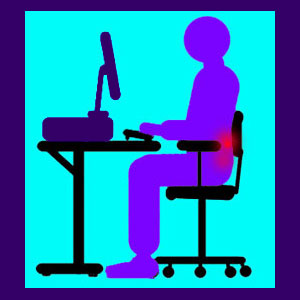
Desk job back pain is a growing problem in the modern workplace, since more and more workers must sit for long periods of time. Why do desk jobs tend to cause and aggravate back pain and sciatica? Is sitting at a desk inherently bad for the spine or back muscles? Is there another possible reason why desk jobs are a leading contributor to back pain besides the actual posture involved in sitting? These are all very important questions to explore and answer if you have a desk job and also suffer recurring or chronic back pain.
There is no doubt that desk jobs are growing in numbers worldwide. Fewer people have active vocations now than ever before in human history. A significant percentage of the workforce works sitting in a static position at a desk all day, every day. What are the current and future consequences of this employment trend?
This discussion details the occurrence of desk job back pain problems in the neck, lower back and legs. We will explore the causes of these painful complaints, as well as provide tips to reduce pain if you must work a desk job now or in the future.
Desk Job Back Pain Symptomology
People who experience desk job back pain most often complain of the following symptoms which might exist alone or in combination with one another:
Lower back pain is commonplace. Often, this pain occurs after an extended time sitting and is relieved to some degree upon standing, walking or stretching. Longer-term pain issues might not resolve at all, even when the person avoids sitting for an extended time frame.
Sciatica is also a very frequent manifestation of desk job pain. Symptoms often affect the buttocks, hip, thighs, calves and feet unilaterally or bilaterally. The person might experience subjective or objective numbness and weakness in affected muscles which may continue after standing, stretching or walking.
Neck pain is also a common symptom of working a desk job, especially for workers who utilize mobile phones, tablets or computer terminals for their jobs. Forward head posture is often observed in these patients.
Serious cases of symptomology might entail spasms in the back muscles, acute pain or the “locking up” of back muscles that can be debilitating.
Desk Job Back Pain Causes and Contributors
Sitting is not inherently bad for the back. However, spending any extended length of time in a static position can cause pain through several mechanisms of action. Additionally, since sitting is a static position, all the usual general health risks of living a sedentary lifestyle also apply. Some of these general health consequences can cause or contribute to back pain, as well, such as obesity and diabetes.
Sitting with poor posture is a definite contributor to many back pain, sciatica and neck pain complaints.
Poor workstation ergonomics can play a major role in the creation and perpetuation of back pain due to long hours at a desk.
Finally, and most importantly, do not forget to account for the stresses of work life. These stresses are often suppressed or repressed, since virtually everyone must work and can not afford to be derailed in their career by stress in the workplace. These repressed psychoemotional stresses are a leading cause of not only back pain, but many chronic and serious health complaints.
Back Pain Relief Despite Having a Desk Job
If you must work a desk job, then there are some things that you can do to make the experience healthier and less likely to cause you back pain, neck pain or sciatica:
If you must sit, then sit correctly, with posture in mind at all times. Keep your feet flat on the floor or on a stool and keep the back supported and straight. Sit flat on the buttocks evenly, not up on one hip or the other. Make sure that your chair is the right height and has arm rests to help support you. Use the abdominal muscles to support you in order to minimize imbalances from overly strained postural muscles in the dorsal anatomy.
Set up your work station to be ergonomic and comfortable. Do not reach, lean or force yourself to acclimate to poor working conditions. Change your environment and decrease your chances of suffering pain.
Get up often to stretch, exercise and walk. If possible, set up your work station so that you can stand and work or sit and work. This is a huge benefit to sedentary workers and one that we use here at the offices of The Cure Back Pain Network for many years already. We sit and stand as desired throughout the day, with an emphasis on standing much more than sitting.
Most importantly, be emotionally aware. Do not suppress or repress stresses. Do not underestimate the psychological consequences of stress on your health. Utilize knowledge therapy to combat the mindbody interactions that can and do cause chronic pain. If you stay aware of your inner emotional state in mind when working, you will have a significantly lower chance of suffering any pain, as well as a much better chance of being very healthy for life!





